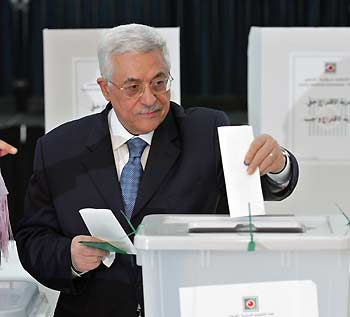|
Palestinians vote in parliament election
(AP)
Updated: 2006-01-25 14:25
Palestinians cast ballots amid tight security Wednesday in their first
parliament election in a decade — a cliffhanger vote on whether to pursue peace
or confrontation with Israel.
The battle between the ruling Fatah Party and its Islamic Hamas rival was
sure to tilt the balance of a Middle East torn between reform and
traditionalism. But concerns over lawlessness, corruption and unemployment also
weighed on voters' minds.

Palestinian President Mahmoud Abbas casts his
vote at Palestinian Authority headquarters in the West Bank city of
Ramallah, January 25, 2006.[Reuters] | Both Hamas and Fatah were confident of victory, but pollsters said the race
was too close to call. Despite the bitter rivalry, both parties said they would
consider a coalition if no clear victor emerges.
Polls opened at 7 a.m. across the West Bank and Gaza, with some 1.3 million
voters eligible to choose a 132-member parliament.
Hamas' campaign has been well organized, focusing on internal issues like
improved public services and cleaner government, while Fatah has been plagued by
disarray and infighting.
Those differences were evident at a polling station in the upscale Rimal
neighborhood of Gaza City where about a dozen Hamas activists, wearing the
group's trademark green hats and bandanas, greeted voters. The volunteers held
computerized lists of voters and assigned volunteer drivers to transport
supporters to the station. Fatah activists were nowhere to be seen.
Hamas organizers said they planned a similar presence at every polling
station in Gaza.
Some 13,000 police officers were deployed at 1,008 polling stations, taking
up positions on rooftops and at entrances to enforce a weapons ban.
Rival militant groups pledged to keep their guns out of sight Wednesday, but
several pre-election skirmishes and two killings, including the shooting of a
Fatah politician in internal fighting Tuesday, kept security forces on alert.
Palestinian police arrested eight Fatah activists early Wednesday in connection
with the killing, security officials said.
Pollsters predicted a turnout of at least 75 percent, Rain forecast for
Wednesday could give an edge to Hamas with its ideologically more committed
electorate.
Nearly 20,000 local observers and 950 international monitors, led by former
President Jimmy Carter, were watching the vote. There were some allegations of
fraud in the 1996 parliament election and the 2005 presidential election that
brought Palestinian leader Mahmoud Abbas to power, but international monitors
said at the time the problems weren't widespread.
Wednesday's election marked the first time Palestinians have a clear choice
between two political camps since Hamas boycotted the 1996 vote.
The Palestinians are at a crossroads, said pollster Nader Said of the West
Bank's Bir Zeit University. "For the Palestinians, the whole national agenda is
on the table," he said. "Do they want continuity or do they want change?"
Hamas spokesman and parliament candidate Mushir al-Masri said he expected his
group to win up to 50 percent of the seats, but that even then it would not want
to rule alone. He said Hamas leaders in Gaza and abroad have spoken with Abbas
by phone in recent days about possible cooperation.
"We could find common ground," al-Masri said Tuesday, sitting in a large
green campaign tent in the town of Beit Lahiya in northern Gaza. "Hamas will not
be in the government by itself."
Hamas is expected to ask for service ministries — health, education and
welfare — and to leave diplomacy, including contacts with Israel, to others. The
group, which has long ruled out negotiations with Israel, has signaled some
flexibility on the issue in recent days, but may not be ready yet for a dramatic
shift of positions.
Fatah leaders have also predicted they'll get more than half the parliament
seats. But if forced to form a coalition, Fatah prefers to govern with smaller
parties and would invite Hamas only if left with no other choice.
Former Gaza strongman Mohammed Dahlan, a leading Fatah candidate, said he's
not opposed to bringing Hamas into the government. "Hamas can't behave like an
opposition (party) if it's in the PNA," Dahlan told the British Broadcasting
Corp., referring to the Palestinian government.
Israel has said it would not deal with Hamas politicians. Israel's acting
prime minister, Ehud Olmert, said Wednesday he hoped Palestinians would not
"choose again the extremists who have led them from tragedy to tragedy and to
sorrowful lives."
Many in Fatah said that despite the risks of losing power, the election will
finally gauge Hamas' strength and force it to assume responsibility. "We want to
face the boogeyman," said Fatah voter Rafik Abu Mariam, a policeman from the
West Bank city of Jenin.
Said, the pollster, said that after competing in the election, Hamas cannot
revert to its militant ways. For nearly a year, Hamas has suspended attacks
against Israel as part of an informal truce brokered by Abbas.
"Hamas has accepted to play within the rules of the game," said the pollster.
"There is no going back for Hamas."
However, others feared a victorious Hamas would eventually impose Islamic
law, despite its attempt to cloak itself in moderation.
"They gave shown political pragmatism in many ways, they will talk to the
West and there will be periods of calm, but ultimately, Hamas will change the
nature of Palestinian society," warned outgoing legislator Hanan Ashrawi, a
candidate for the moderate Third Way Party.
"It might be a serious indicator of what will happen to the rest of the Arab
world."
|